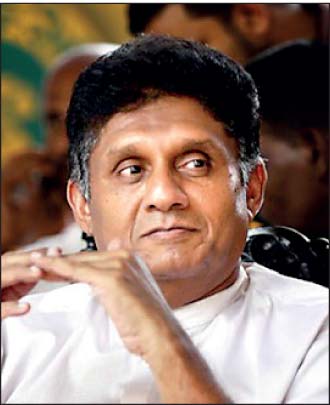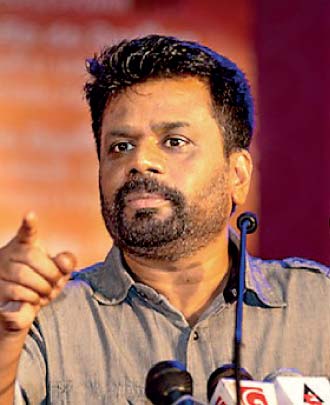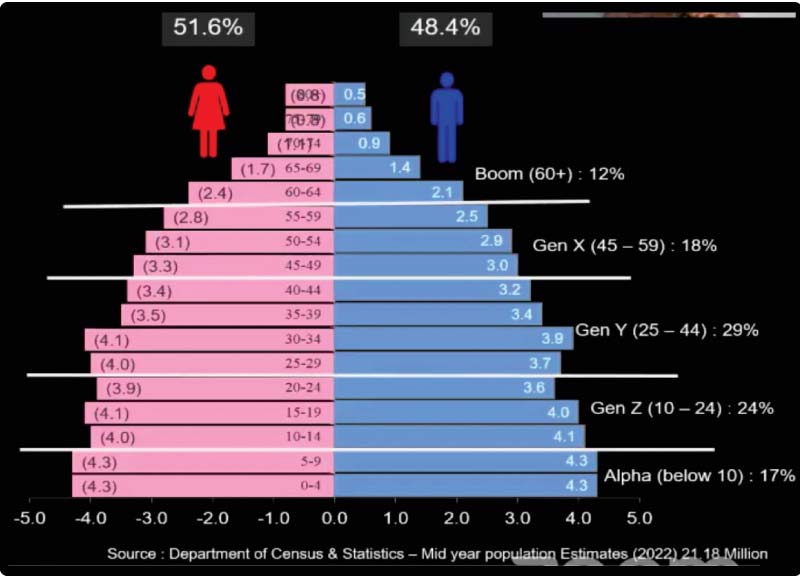Monday Feb 16, 2026
Monday Feb 16, 2026
Monday, 27 May 2024 00:25 - - {{hitsCtrl.values.hits}}
 The trending theme in Sri Lanka in the recent past are the probable alliances and crossovers between political parties/politicians targeting the Presidential elections 2024. Whilst there can be merit to this approach of influencing a Sri Lankan voter, what many forget is that this type of ‘consumer behaviour’ will not be the reality this year. For instance, a research insight shows that when voting happens in Sri Lanka, the floating vote is around forty percent. Some speculate that the floating percentage can be higher given the low confidence the public has towards politicians. Let’s accept the fact that environmental conditions together with poor decision making by politicians made Sri Lanka become a bankrupt state. The IMF clearly stipulates that the Governance Diagnostic Assessment report reveals severe Governance weaknesses and corruption vulnerabilities across functions contributed to the financial collapse of Sri Lanka.
The trending theme in Sri Lanka in the recent past are the probable alliances and crossovers between political parties/politicians targeting the Presidential elections 2024. Whilst there can be merit to this approach of influencing a Sri Lankan voter, what many forget is that this type of ‘consumer behaviour’ will not be the reality this year. For instance, a research insight shows that when voting happens in Sri Lanka, the floating vote is around forty percent. Some speculate that the floating percentage can be higher given the low confidence the public has towards politicians. Let’s accept the fact that environmental conditions together with poor decision making by politicians made Sri Lanka become a bankrupt state. The IMF clearly stipulates that the Governance Diagnostic Assessment report reveals severe Governance weaknesses and corruption vulnerabilities across functions contributed to the financial collapse of Sri Lanka.
Is the SL voter a fool?
Many highlight that it is a Sri Lankan voter that has selected these politicians that have made Sri Lanka go bankrupt and hence the Sri Lankan voter is also responsible for the current situation in Sri Lanka.
However, if one becomes data driven this notion does not hold ground. If we track back to the 2010 elections the politics party that gave leadership for the elimination of the most ruthless terror organisation was voted in with a landslide majority. However, exactly after five years this very entity was thrown out by the voters in the Sri Lankan General Elections of 2015 due to the alleged corruption reported in the media. The Sri Lankan voter opted for the ‘Yahapalanaya’ regime but again in the 2019 election this entity was voted out due to the much publicized ‘bond scam’ of the Central Bank. A point to note is that the outgoing political party with Ranil Wickramasinghe et al could not even garner 1 seat in parliament. That is how ruthless the Sri Lankan voter is in reality.
The famous Gotabaya was voted in by the Sri Lankan voter in 2019, but once again when he could not perform the very voter that brought him with a two thirds majority kicked him out ruthlessly. Finally, he had to jump a boat and flee to the Maldives Islands and then go country-hopping, before finally coming into Sri Lanka in absolute disgrace.
Let’s not forget that, here was a man that defeated the most ruthless terror organisation globally – the LTTE and made Colombo the number one city globally at one time. But the power of the Sri Lankan voter and the wrath by them made the Government hierarchy to resign.
This showcases the power of a Sri Lankan voter. They are not pushovers. They are educated and they are not scared to make serious decisions. As history reveals, a Sri Lankan voter is well-informed and they make cutting-edge decisions for the betterment of the country, which means that alliances and political cross overs cannot influence the final decision of a Sri Lankan voter.
 |
| Sajith Premadasa |
 |
| Anura Kumara Dissanayake
|
2024 - unique election
Whilst understanding the power of the Sri Lankan voter, the 2024 election will be unique as the consumer reality is very different. The Gen Z and Gen Y segments will be dominant in the swing vote of Sri Lanka. The Gen Z group can be as high as a million votes whilst the younger group of the Gen Y will be another million which is the power if the youth vote in the 2024 elections.
This group will not be swayed by alliances’ share of voice. Some say that they are just getting their feet wet in politics. Kantar Sri Lanka research reveals that 92% of the Gen Z youth are not affiliated to a political party whilst 76% of them are planning to cast their vote at the 2024 elections. They are strongly information led and will search for information about their candidates and their positions on aspects like environment, corruption, equal rights and gender issues. From these attributes, the strongest will be corruption given that Sri Lanka has yet not learned a lesson from the economic collapse that happened two years ago in Sri Lanka. The best case in point is the Alleged Visa Scam that broke out in Sri Lanka around two weeks back that the current President has been absolutely silent on. Many speculate that it is similar to the Famous Bond scam that happened during the earlier spell of governance where he was once again silent. A recent media report stated that the current President had promised in Parliament that he will ensure that the then Governor of the Central Bank will be brought to justice from Singapore which has not happened to date. A point to note is that the Gen Z and Gen Y are opinion formers in Sri Lanka media due to their strong communication on social media. The real verdict will appear from the youth of Sri Lanka namely Gen Z and the younger Gen Y segments is what research analysts predict.
Youth of 2024
What politicians fighting for share of vote from the 2024 elections must keep in mind is that the last two years have been the worst years that Sri Lanka has seen. Covid-19 pandemic, Petrol queues, People being beaten up on the street. This is the backdrop that these segments of Gen Z and Y early age groups have grown up. They have seen how one of the most powerful and fearful leaders like Gotabaya Rajapakse was chased away on a boat from the country. They have seen how corruption by the politicians made people boo and reject them at the village end when they came for openings or commemorations. The negative attitude to politicians is so strong that the private sector has stopped inviting politicians for important functions. In some cases, sections of the audience who are mainly youth walk out. The best case in point was where a young graduate refused to accept an award at a Graduation Ceremony of an elite university in protest for affiliation with a corrupt politician. This is the reality in which Sri Lanka goes for elections in 2024.Once again, research reveals that Gen Z and Gen Y are the main decision makers in a home or for that matter joint decision makers when it comes to household purchases. Especially Gen Z who are strong influences. Which means that even though some segments of Gen Z might not be voters, they can be strong influences on the choice of the political candidate.

|
|
Pick up to politicians
The 2024 Elections will be very different to past elections. Alliances and money invested on free hand-outs will not get you votes. People will be more interested in the key issues like the solutions for the burning’s household issues like electricity prices, the increasing cost of education, the escalating prices of food which has doubled in the last two years. Recent surveys reveal that Health has become a key issue at home due to the prices of medicines that have gone up in the backdrop of the pharmaceutical scam that has led to a group of policy makers to be remanded including a cabinet minister. Job security and work life balance is the next in the cards that will include decision making in a home. Research also reveals that blatant disrespect to governance like the Visa Scam has once again highlighted the corruption attribute that will be a key game changer on the selection of the 2024 elections.
Conclusion
Whilst the political parties are focussing on the best practices of past elections like driving alliances, what political candidates must take cognizant of is that the game has changed. People are going to be more independent and decision making will be based on information and data especially due to the tilt of Gen Z and Gen Y youth in the fray.
(The author is experienced in Artificial Intelligence (AI) based brand tracking that drives brand strategy and decision making. The thoughts are strictly his own and not the views of the organisations he serves. )